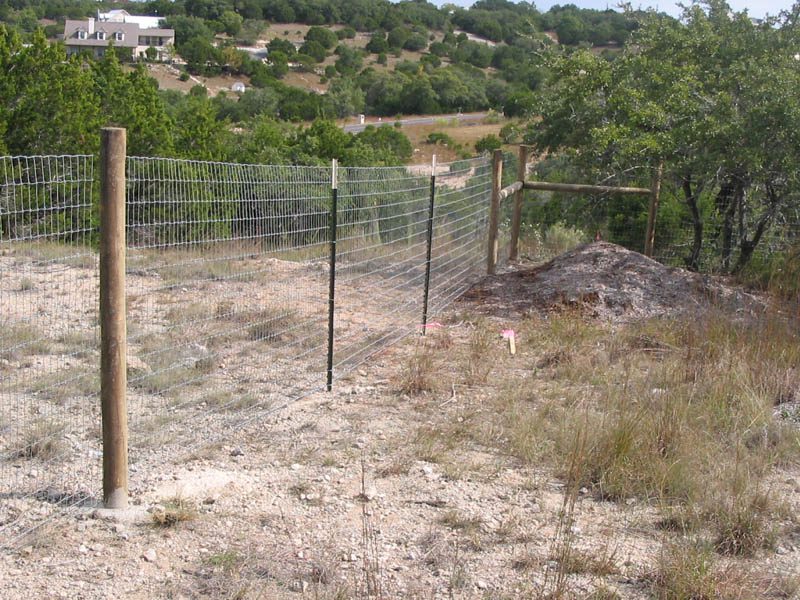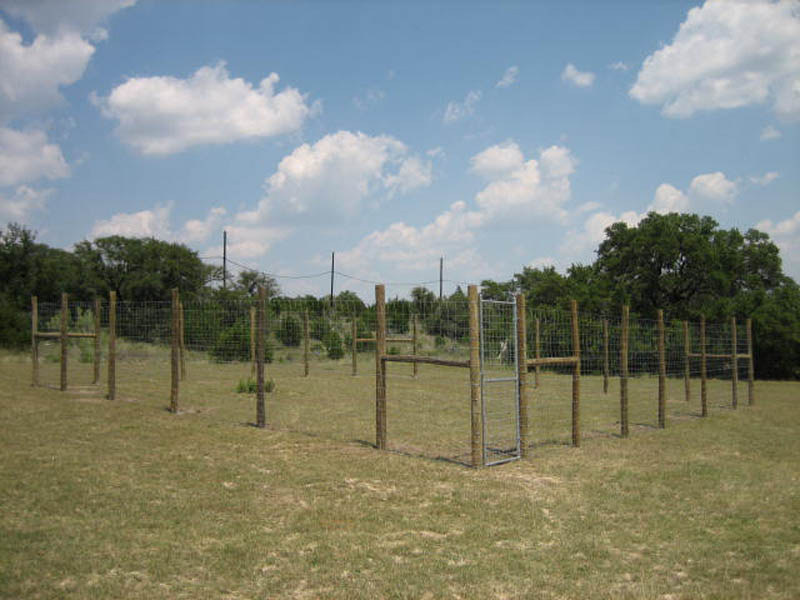The U.S. has an estimated 30 million deer, and controlling them is a common concern for many homeowners. Although you may think of all deer like Bambi, in reality, they’re considered pests. Not only are deer notorious for eating and wreaking havoc on gardens and backyards, but they can also carry dangerous ticks that can cause Lyme disease. The best way to prevent your yard from being destroyed by deer or exposed to the illnesses they carry is by adding a fence.
So, what is the best fence to keep deer out? In this blog post, we’ll explore the top four deer fences that will protect your backyard from these unwanted visitors. Whether you’re looking for a budget-friendly fence or a high-end deer fence, we’ll discuss the pros and cons of each type of deer fence. Hopefully, by the end, you’ll be able to find the perfect deer fence for your property.
What is a Deer Fence?
A deer fence is a tall, strong, and see-through fence designed to prevent deer from entering your property. It is typically taller than regular fences, often 8 feet high, and strong enough to withstand deer crossings. These fences can often last up to 20 years and are great for protecting gardens and crops. Some deer fences use a mild electric shock to teach deer to stay away. The main function of a deer fence is to create a barrier that deer cannot cross, protecting plants, gardens, and farm crops.
Types of Deer Fencing
When it comes to protecting your property from deer, there are several types of deer fences to consider. Each type of fence has its own set of advantages and disadvantages, so take these factors into consideration before deciding on a deer fence for your property.
Invisible Fencing
Invisible fencing uses technology to set boundaries using actual fences. An invisible fence uses wires buried on your property to send out a radio signal. This signal is picked up by a collar that your pet wears to warn it’s getting too close to the boundary. These fences are best used to keep pets out of certain areas, like gardens or pools.
Pros
- Effective at keeping pets within your property
- Provides a clean look
- Flexible
Cons
- Requires training your pets
- Limited boundaries
- Won’t prevent other animals from entering your property
Electric Fencing
Electric fencing, including high-tensile and poly-wire fencing, is a great way to keep deer out of your yard. These fences use wires that carry a mild electric current. When animals touch the wire, they get a quick, sharp shock to keep them from crossing onto your property. Electric fences can be powered by electricity from your home or by solar-powered batteries. This makes them great for remote areas. They’re often used to keep livestock on the property and to protect farms from outside animals.
Pros
- Cost-effective for large areas
- Protects property from predators
- Helps contain livestock
- Works well on different types of terrain
Cons
- Requires regular maintenance and voltage checks
- Might raise issues about animal welfare
- Electric fencing might not be the best choice for places with a lot of people.
Metal-Mesh Fencing

Metal mesh, also known as wire mesh fencing is made of heavy-gauge metal and attached to posts. It is the more expensive of the two options and is incredibly durable. You can choose to leave the mesh in its natural state, or coat it with black polyethylene to make it look nearly invisible. It’s important to note that if you decide you want the coated mesh, be prepared to pay a little more.
Pros
- Can handle all kinds of weather
- Keeps animals in and intruders out
- Low maintenance
- Available in different heights and sizes of mesh
Cons
- Can impact the look of your property
- Can be expensive, especially for covering large areas
- May require professional installation
Polypropylene-Mesh Fencing
Like wire mesh fencing, a polypropylene mesh fence is simply created by attaching the mesh to a pole in the ground. Because polypropylene isn’t as durable as metal mesh, this fencing type is less expensive. In addition, if aesthetics are important to you, this mesh variation is nearly invisible which will allow you to enjoy uninterrupted views of your landscape. Make sure that if you select this fencing type that you choose one that has a high breaking load so that if a deer attempts to get through your fence, it won’t break.
Pros
- Lightweight and easy to install
- Blends well with surroundings, keeping your property looking good
- Great for temporary or seasonal use
- Easily customizable
Cons
- Less durable than metal options
- May require more frequent repairs, especially in windy areas
- May not be strong enough to contain large or aggressive animals
Factors to Consider When Choosing Deer Fencing
Of course, when contending with deer, your standard privacy fence or decorative fence won’t cut it. When shopping for a deer fence you need to consider:
Fence Height: Deer can jump incredibly high, so your fence needs to be tall enough that they can’t get over it. Typically deer can jump just under 8 feet in the air, so you should plan on your fence being around 8 feet tall or higher.
Need for Slack: Because deer will try to dig and push underneath your fence it needs to have some slack to it. For example, if you select a wire mesh fence, you should extend the wire mesh and allow it to spill out over the ground in front of the fence and then pin the excess down with stakes. This will ensure there are no gaps between the fence and the ground. Also, deers like to push fences so the extra slack will allow them to push the mess and block them from coming in.
Fence Repair & Maintenance:It’s important to keep in mind the costs when repairing and maintaining a deer fence. Barriers are ineffective in deer-proofing and need to be repaired immediately if they have been damaged by a breach. The animals are smart enough find this weakness, so quick attention is necessary for barrier-style fences!
Pests: If you want to keep rabbits, raccoons and other small mammals from infesting your garden or yard then barrier-style fencing is for you. The openings in this type of design are too wide for pests like rats which means that they cannot get through smoothly.
Durability: When choosing a deer fence, you need to consider one that can withstand not only a deer but also the elements. Deer can put a lot of pressure on a fence, and local weather conditions can take their toll on it. To make your deer fence last as long and strong as possible, choose one with an extra protective coating like galvanized or UV-protected metal.
Visibility: Some deer fences are nearly invisible, while others can be pretty noticeable. You should think about how you want your fence to look and if it will increase your property’s value or not.
Gates: When you’re finished with the fence, make sure to install entry gates or other means of entering and exiting so that deer don’t get into your yard.
Ease of installation: Some deer fences are easier to install yourself, while others require a fence contractor to build. Also, a fence contractor will be able to help you navigate your local laws and HOA rules building your fence.
Local deer population and behavior: The number of deer in your area and their behavior can greatly influence your choice. High deer populations might require stronger, more durable fencing.
Cost: Some deer fences, like electric fences, are more cost-effective but might not last as long, while vinyl fences are more expensive but durable.
Conclusion
These deer fences will work effectively to keep deer out of your property, so your selection will most likely be determined by your budget. No matter the type, whether it’s wood, vinyl, or chain-link, Austin’s leading fence builder Sierra Fence will be able to customize your fence to exactly fit your needs. Give us a call today to discuss your project and get started on creating the perfect fence for your property!
Deer Fencing FAQs
How tall does a fence need to be to keep deer out?
A fence should be at least 8 feet tall to keep most deer out.
Can deer jump over a 6-foot fence?
Yes, many deer can jump over a 6-foot fence quite easily.
How long do deer fences typically last?
A well-made deer fence can last 15 to 20 years, sometimes longer, with good care.
Will an electric fence keep deer out?
Yes, if set up correctly.
What is the best fence to keep deer out of the garden?
Did you know that homeowners can experience up to $2,000-$5,000 in damage to their gardens and landscaping per year due to deer? An 8-foot mesh fence or an electric fence will easily keep a deer out of your garden.
What gauge wire is best for a deer fence?
For mesh fences, use 14 to 16-gauge wire. It’s strong enough to stop deer but won’t cause your fence to sag.
What is the best color for a deer fence?
Black or dark green. They blend in with the surroundings and are less noticeable.
Will deer fencing affect my property value?
It depends. A well-built fence might increase your home’s value. But a very tall fence might bother some buyers. It’s best to check your local rules and regulations before building a deer fence.
